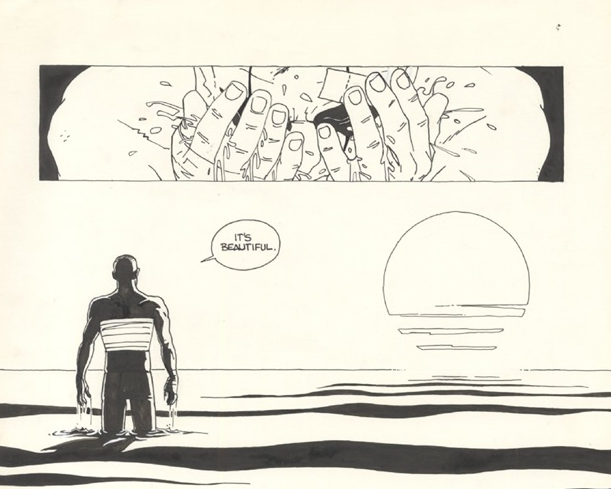I made it a point to get out among the blogging world and read each and every contribution to the discussion, and I thought it might be valuable to sum up what I've learned here, as a way to bring some closure to the event. The feelings here are my own impressions of the writings of others and therefore may not be exactly the same as what they had intended. As with any generalizations, there are going to be some comments that may not fit exactly, but they serve my general purpose.
I think one of the most interesting things I learned from this feast is that not only was Rumiko Takahashi one of the first exposures quite a few of us had to manga, it was often Ranma 1/2 that got us started. This was true of people who got into manga at all different points in the timeline of the "manga invasion." It seems like this absolutely insane series spawned a legion of fans, who then told a bunch of other people and, because it was also a floppy-trade-trade book (getting three sets of printing from Viz at various points in time) with a clever anime to boot, there were a lot of points of entry for people to start reading Ranma 1/2 over the years.
I am of course totally in the tank for Ranma, easily my favorite Takahashi series, so seeing it get so much love in the general discussion posts did my heart a lot of good. It may be low comedy and not to everyone's taste, but with a certain generation of manga lovers, Ranma is a touchstone we can all look back to.
On the flip side of this, however, is that Ranma 1/2 is also an older series with very little bookstore exposure. It's 36 volumes long, and the jokes are not for everyone. The importance we place on Ranma (and to a lesser extent, so much of the Takahashi canon) shows that while she is a classic, until we start getting "Essential Manga" omnibuses, it's entirely possible that the next generation of manga readers growing up now will not have this strong of a connection to Takahashi, unless things change significantly regarding Rin-Ne. (More on Rin-Ne in a moment.) One of the things I'm wrestling with, and will probably mentally argue all year, is whether Takahashi has a place in the manga world today, with readers who are just starting out.
The question of Takahashi's current relevance is one that I don't think we answered sufficiently. That may have to do with when most of the manga bloggers I know started reading manga. The internet is a huge place, so naturally we tend to hang out with who we already know. Because so many people who contributed have been reading manga for so long (I think I'm "newer" by not starting until 2003 or so), a lot of the discussion was centered on either older Takahashi works revisited, especially Mermaid Saga and the Rumic World/Rumic Theater collections.
I also have a love for these now out of print collections, and I think that the short story anthologies in particular cement Takahashi's legacy as a woman who could create anything her heart desired, she just prefers comedy. But the topics definitely skewed to her older material and talked primarily about how good they were and how much we liked them both on initial reading and also on a re-read.
However, with the exception of the frequent comment "this is out of print, but available" I don't think anyone did a very good job of framing the idea of whether new manga readers still find Takahashi. I'd love to know if there are young comics readers out there finding out about Rumiko Takahashi and trying to track down copies of Maison Ikkoku or Urusei Yatsura. Heck, I would have even been interested to see if she's being scanned on the darknet.
That's a theme we as bloggers did not really address this week and because I do not have any real ties to the industry and am not able to read Japanese, it's not an idea I can easily pursue myself. I really wish our appreciation of Takahashi had also included more commentary about her place in manga today, not as an icon (which she certainly is), not as a success story (over 100 million books sold is clear enough), but as a modern-day author. Perhaps someone out there has done this, and if so, I'd love to read it.
Changing gears a little bit, I really was surprised at the general lack of articles about InuYasha. The series just ended, it's 56 volumes long, and it was extremely popular. The fact that such a long and successful series was ending actually contributed to the suggestion that there be a spotlight on Takahashi. Ultimately, however, that spotlight shined elsewhere when the time came for discussion. Anyone have a theory on what that might be? I've not read oodles of InuYasha, but I liked what I did read, so I don't think it's a quality issue. Maybe fatigue? A feeling that everyone else would do it? Perhaps the series was just too popular and made it a less cool object of discussion?

The final thing that really shocked me was the really tepid reception towards Rin-Ne. I realize I've said this a few times now, including on an upcoming podcast with Ed Sizemore, Sean Gaffney, and Kate Darcey, but given how much positive ink has been spilled over the years for Rumiko Takahashi, it surprised me that for the most part, the reviews of Rin-Ne were anything but supportive of the work, at least so far. Alex was definitely an exception to this rule, as his reviews become increasingly positive. Most who opted to write positively about the series, however, seemed to struggle with reasons why they liked it. Those who did not like the series had no such issues, which leads me to believe support for Rin-Ne is thin.
Generally speaking, I like Rin-Ne, and would recommend it to folks who like light comedy. I don't think it's amazing, and so far, it doesn't seem to be as good as her other works. That's where I think the issue is with Rin-ne: We want it to be another amazing comic, and the idea that Takahashi might just be writing a good or solid comic is troublesome, leading to either criticism of the work or difficulty in supporting it.
The question I have for myself that I don't know the answer to is, "Would I keep reading Rin-Ne if it were written by anyone else?" That's a question for another day, however. It's definitely one that I throw out there to the Takahashi fandom. If the answer is "no" then this is definitely a miss in her career as a creator. It would be a real shame if a flawed comic was her swan-song.
As I said during the discussion itself, there's so much that can be said about Rumiko Takahashi that the work will never be done, even after we've all given up on blogging and are replaced by other bloggers or other technologies. These were just a few of my thoughts coming out of conversations we had. I'd like to once again thank everyone who helped make the Rumiko Takahashi Manga Movable Feast such a success, and I urge everyone to keep the discussion going, both here in my Year of Takahashi and everywhere else across the web.
Next week, it'll be my turn to take a crack at Rin-Ne. Will I, too, succumb to damning it with faint praise? Tune in next week to find out!









